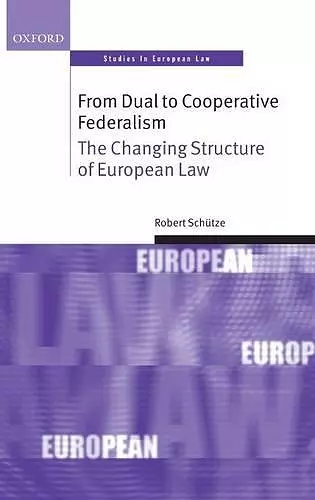From Dual to Cooperative Federalism
The Changing Structure of European Law
Format:Hardback
Publisher:Oxford University Press
Published:15th Oct '09
Currently unavailable, and unfortunately no date known when it will be back
This hardback is available in another edition too:
- Paperback£54.00(9780199664948)

What is the federal philosophy inspiring the structure of European law? The federal principle stands for constitutional arrangements that find "unity in diversity". The two most influential manifestations of the federal principle emerged under the names of "dual" and "cooperative" federalism in the constitutional history of the United States of America. Dual federalism is based on the idea that the federal government and the State governments are co-equals and each is legislating in a separate sphere. Cooperative federalism, on the other hand, stands for the thought that both governments legislate in the same sphere. They are hierarchically arranged and complement each other in solving a social problem. Can the European Union be understood in federal terms? The book's general part introduces three constitutional traditions of the federal idea. Following the American tradition, the European Union is defined as a Federation of States as it stands on the "middle ground" between international and national law. But what federal philosophy has the European Union followed? The special part of the book investigates the structure of European law. Three arguments are advanced to show the evolution of the European legal order from dual to cooperative federalism. The first looks at the decline of constitutional exclusivity on the part of the Member States and the European Union. For almost all objects of government, the Union and its States operate in a universe of shared powers. The second argument analyses the decline of legislative exclusivity. European and national legislation - increasingly - complement each other to solve a social problem. The third argument describes the "constitutionalisation" of cooperative federalism in the form of the principle of subsidiarity and the idea of complementary competences. A final Chapter is dedicated to Europe's foreign affairs federalism. It analyses, whether the external sphere must be regarded as subject to different constitutional or federal principles. The book concludes that cooperative federalism will benefit both levels of government - the Union and the Member States - as the constitutional mechanism of uniform European standards complemented by diverse national standards best expresses the federal idea of "unity in diversity".
...this volume will give for sure an important contribution to the "rehabilitation" of the federalist approach * Giuseppe Martinico, Pisa, CML Review *
In an overwhelmingly important book Schutze brilliantly exposes the obscurantist anti-realistic vision of the European federation in such a splendidly clear and overwhelmingly convincing way that those who will not open their eyes now are not just wrong out of principle. They are blind. For all the rest there is a discovery to make: there were and there are more federations in the world that just the EU * Dimitry Kochenov, University of Groningen *
...a timely and relevant contribution that provides for a totally enjoyable and inspiring read and helps us understand better the structure of European Law * Nikos Skoutaris, Lecturer in European Law, University of Maastricht *
...a valuable tool, covering political aspects of federalism, its application to the EU, and the stance of the ECJ with an interdisciplinary approach. * Panos Stasinopoulos, King's College London, Journal of Common Market Studies, 48.4 *
- Winner of Winner of the 2010 UACES Best Book Prize.
ISBN: 9780199238583
Dimensions: 240mm x 163mm x 31mm
Weight: 794g
430 pages